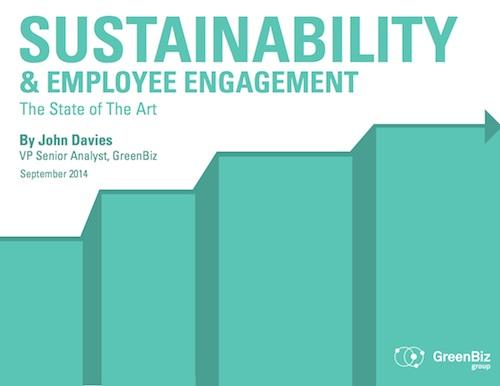New Report Links Employee Education on Sustainability with Value Creation

OAKLAND, Calif., September 11, 2014 /3BL Media/ – Companies with more advanced sustainability education programs are more likely to be harnessing sustainability to develop new products and markets, according to a new report from GreenBiz Group.
The report, “Sustainability and Employee Engagement: The State of the Art,” is based on a survey of more than 1,300 companies of all sizes. It follows on similar research conducted by GreenBiz, in partnership with National Environmental Education Foundation, in 2008 and 2011.
“Employee engagement strategies undertaken by sustainability executives have changed considerably since 2008 when we first released our survey results,” explained John Davies, GreenBiz Group vice president and senior analyst, who authored the report. “Today, those with more advanced education programs are leveraging these efforts to improve their competitive position. They are also changing how they communicate and educate their employees. Perhaps most importantly, they’re learning how to work with HR to leverage their expertise.
Among the key findings:
· Education as a competitive differentiator. GreenBiz’s research found a significant difference between companies that believe they have a more advanced sustainability education program and those that consider themselves beginners. Sixty-three percent of those with advanced programs are harnessing sustainability as a foundation for innovation, new products, and new markets, while just 37 percent of beginners are doing so. And when it comes to greening the supply chain, 59 percent of advanced programs are focusing on this, compared to 38 percent of beginners.
· Sustainability encompasses more than environmental initiatives. “Sustainability” has grown to be the leading term to describe a company’s environmental and sustainability activities. Fifty-one percent of those surveyed favor that term; the next most popular term, “corporate social responsibility,” was preferred by only 12 percent. This may reflect the fact that 94 percent of respondents believe that environmental and social issues will be more connected in the next five years.
· Education strategies are changing. There's been a change in how companies are educating employees about sustainability. In 2008, online training and hiring consultants were two of the most popular strategies employed. In 2014, both had decreased in importance by 16 percent. The two strategies that have grown the most since 2008 are the use green teams, which grew by 42 percent, and the use of employee networks, which increased by 29 percent.
“NEEF hopes the day will come when every American feels he or she has a role to play in ensuring the welfare of our planet and its people,” says Diane Wood, executive director of the National Environmental Education Foundation. “What better place to start than at the workplace? We are excited to see that more companies are recognizing the value of sustainability education for employees and harnessing its tremendous potential to drive engagement and help meet sustainability goals.”
Some of the challenges companies face in integrating sustainability into employee culture begin with language, Davies found. “For the human resources department, the term ‘employee engagement’ means something different than for most sustainability professionals. When sustainability professionals talk about employee engagement, they are often referring to employee volunteering, or perhaps more appropriately, participation.”
Leading sustainability professionals understand that to enroll HR as a productive partner, it’s important to meet them on their terms, Davies concluded.
“Employee engagement still feels to many sustainability advocates as an indirect path and even a way to get around dealing directly with the corporate responsibility issues from a business perspective,” says Shannon Schuyler, US corporate responsibility leader at PwC, which helped fund the report. But, she notes, “I would disagree. With 40,000 staff and partners in the U.S. and 200,000 globally, our firm's ability to incrementally gain promoters and scale behavioral change is critical.”
The free report can be downloaded at http://www.greenbiz.com/research/report/2014/09/08/sustainability-employee-engagement.
###
ABOUT GREENBIZ GROUP
GreenBiz Group’s mission is to define and accelerate the business of sustainability. It does this through a wide range of products and services, including its acclaimed website GreenBiz.com and e-newsletters, GreenBuzz and VERGE; webcasts on topics of importance to sustainability and energy executives; research reports, including the annual State of Green Business; the GreenBiz Executive Network, a membership-based, peer-to-peer learning forum for sustainability executives; and conferences: GreenBiz Forum and VERGE.

